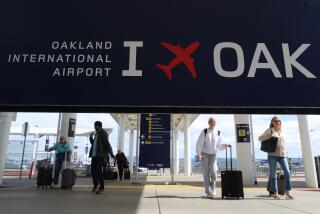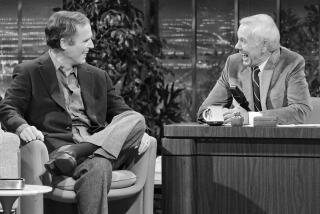Lockheed Asks Jury to Raise Cost of Land Bought by Airport
- Share via
BURBANK — In a case that could undermine Burbank Airport’s bid to acquire land for a new terminal, Lockheed Martin attorneys on Wednesday asked a jury to force airport officials to pay $128 million for the company’s 130-acre Plant B-6 site.
Lockheed Martin attorney Robert E. Willett said the site’s proximity to the runways, along with rising land values and its potential for commercial development, make it worth more than three times the price set by the Burbank-Glendale-Pasadena Airport Authority.
Willett’s comments came during closing arguments in a Burbank Superior Court case in which Lockheed Martin is challenging the Airport Authority’s valuation of the site. The case is expected to go to the jury today.
Lawyers for the Airport Authority, which seized the land in 1997 using powers of eminent domain, contend that soil contamination from years of defense manufacturing put the true value of the site closer to $40 million.
A jury ruling in Lockheed’s favor could force the Airport Authority to downsize its terminal design plans, or even find a new location, according to officials who requested anonymity.
“If the jury comes back with a verdict that’s high enough, the airport could conceivably have to walk away from the land,” said one official familiar with the case. “And that would be calamitous.”
The proposed replacement terminal has been the center of a legal and political feud between Burbank Airport and the city of Burbank since 1995. Most of the fighting has been over the number of terminal gates and restrictions on commercial flights.
In recent weeks, concessions by Burbank Airport and the city of Glendale, as well as the resignation of the airport’s executive director, have raised hopes that a deal could be struck soon.
But that debate has not been part of the case being heard before Superior Court Judge Carl J. West, which centers on setting a price for the property.
Besides touting the value of the land, Lockheed lawyers took the Burbank Airport attorneys to task for using what they argued were scare tactics to convince the jury the land was worth less.
“In this case a government agency wanted to take the property and low-ball the price,” Willett said. “They wanted to create the impression the property had a problem and was worth less.”
Willett added that despite the contention that there were problems with asbestos and chromium on the property, Lockheed had already done the necessary cleanup.
He also said that as of the purchase date, no regulatory agency had found any problems that would keep the airport from building a terminal. Ground-water issues were not part of this lawsuit either, he added.
Three years ago, Lockheed agreed to pay $60 million to more than 1,300 current or former city residents who complained about the old Skunk Works plant. It is still the target of civil litigation from residents left out of that settlement.
Lockheed Martin is the successor to Lockheed Corp., which was founded in Burbank more than 60 years ago and at its peak employed nearly 100,000 people and churned out advanced military aircraft for World War II and the Cold War era--including the P-38, the U-2 and the F-117A Stealth fighter.
Lockheed Martin, the city of Burbank and other businesses reached an agreement in 1997 with the federal Environmental Protection Agency and the state attorney general’s office to pay $60 million as part of a 20-year commitment to clean contaminated water supplies.
In the late 1980s, Lockheed Martin began closing its Burbank facility and moved manufacturing to Palmdale and Marietta, Ga. The company’s headquarters is now in Bethesda, Md.
More to Read
Sign up for Essential California
The most important California stories and recommendations in your inbox every morning.
You may occasionally receive promotional content from the Los Angeles Times.













